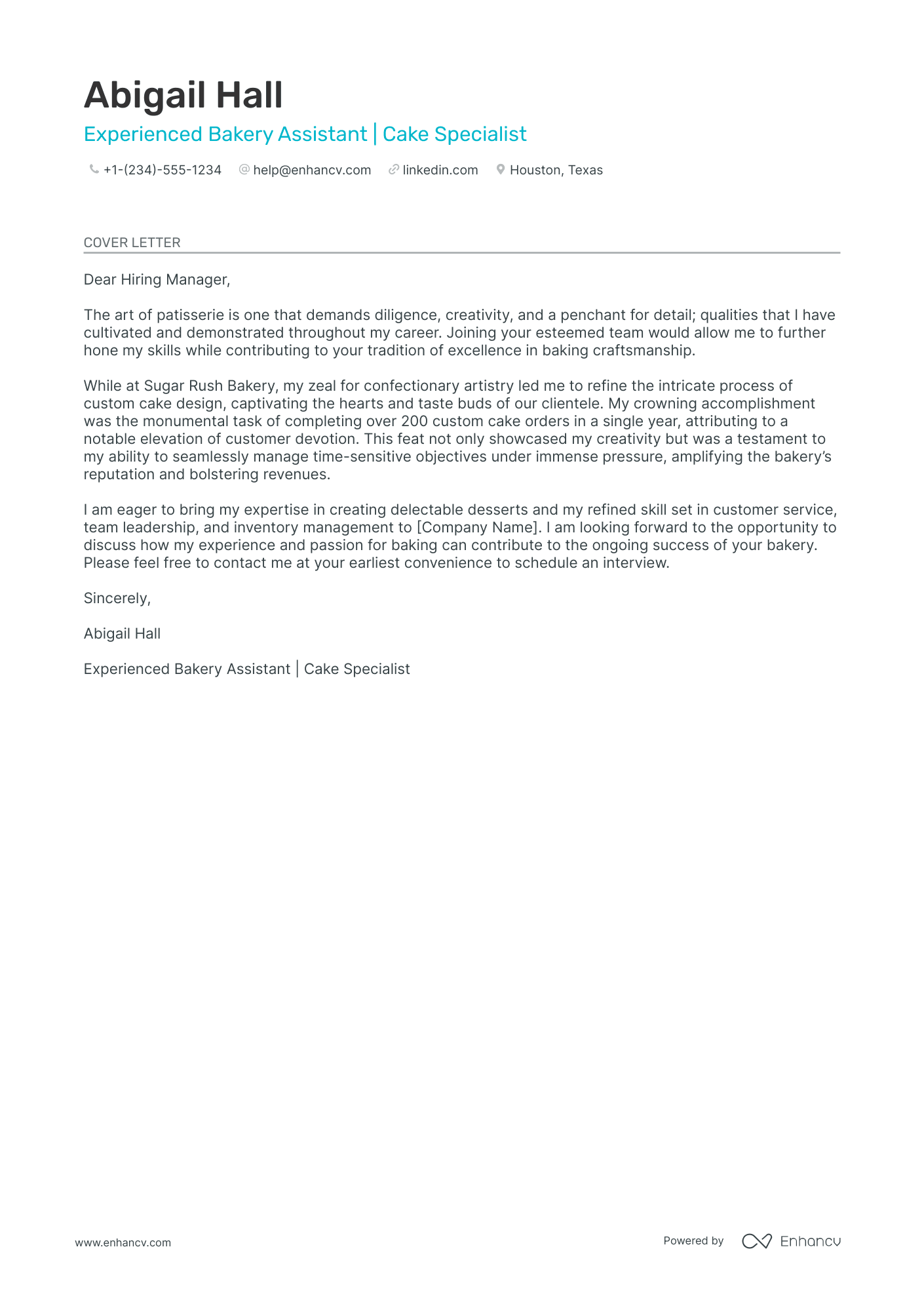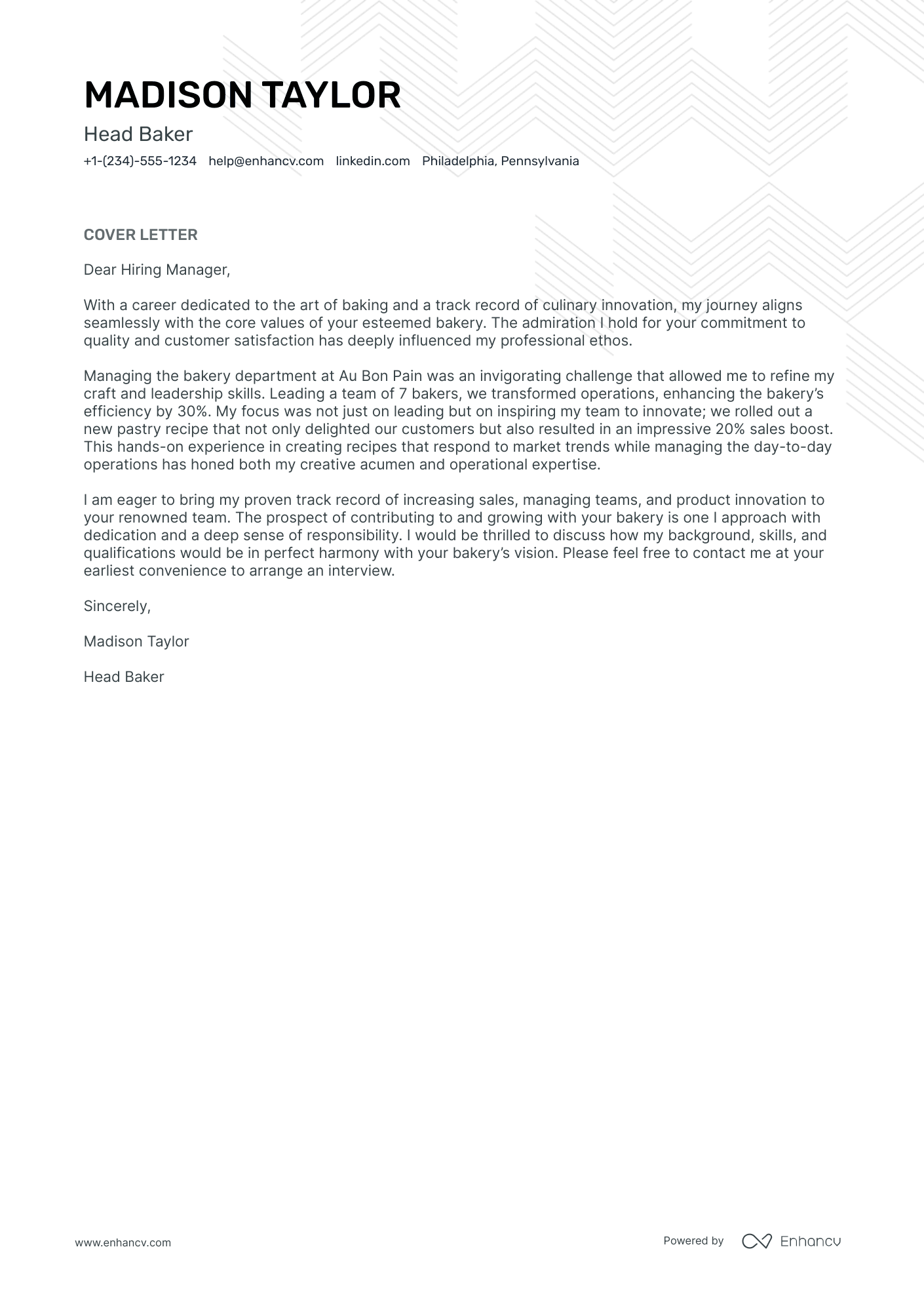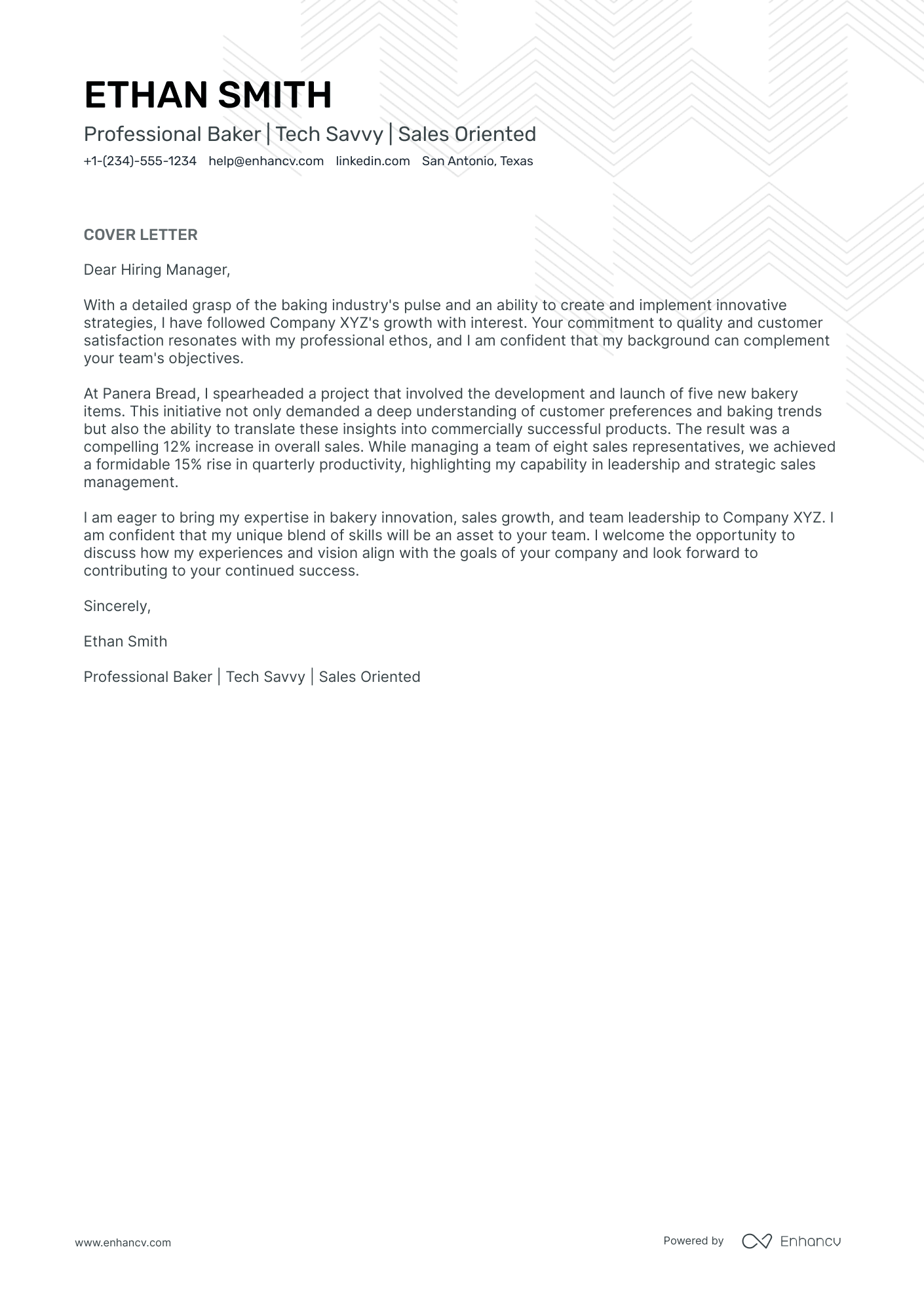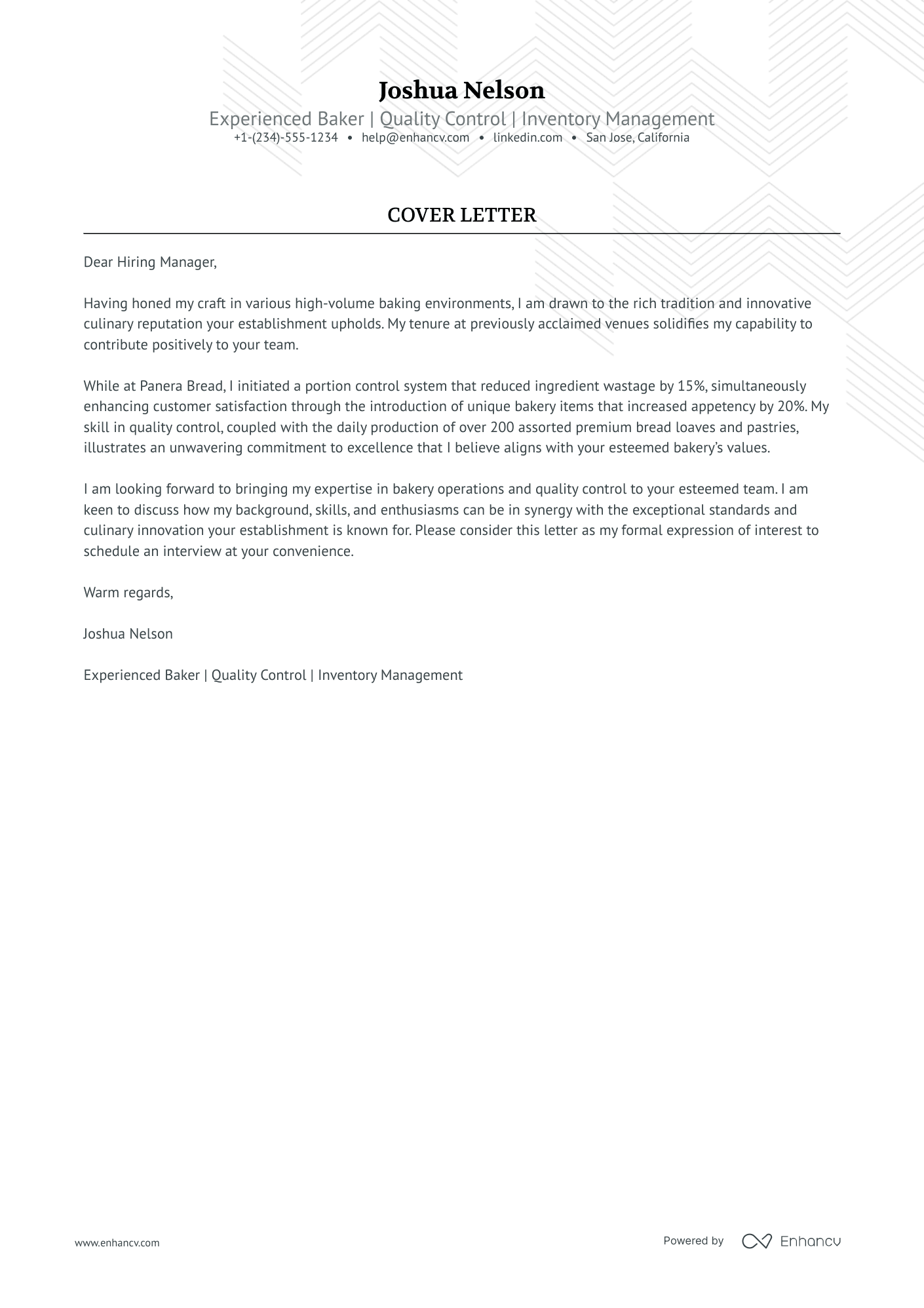Crafting a baker cover letter can often seem like a daunting task, especially when you're eager to pair it with job applications that request one. It's crucial to strike the right balance—your cover letter should tell a compelling story about a significant professional achievement without echoing your resume. Aim for a tone that's formal yet fresh, steering clear of worn-out phrases, and remember to keep it concise, no more than a single page, to make a lasting impression.
- Writing the essential baker cover letter sections: balancing your professionalism and personality;
- Mixing storytelling, your unique skill set, and your greatest achievement;
- Providing relevant (and interesting) information with your baker cover letter, despite your lack of professional experience;
- Finding the perfect format for your[ baker cover letter, using templates from industry experts.
Leverage the power of Enhancv's AI: upload your resume and our platform will map out how your baker cover letter should look, in mere moments.
If the baker isn't exactly the one you're looking for we have a plethora of cover letter examples for jobs like this one:
- Baker resume guide and example
- Waiter cover letter example
- Restaurant General Manager cover letter example
- Banquet Server cover letter example
- Bartender cover letter example
- Food Service Manager cover letter example
- Head Bartender cover letter example
- McDonalds cover letter example
- Bartender Server cover letter example
- Bar Manager cover letter example
Drop your resume here or choose a file.
PDF & DOCX only. Max 2MB file size.
Baker cover letter example
Abigail Hall
San Jose, California
+1-(234)-555-1234
help@enhancv.com
- Customization: The cover letter is tailored specifically to the bakery's values, mentioning the alignment with their commitment to high-quality, locally-sourced, organic ingredients.
- Quantifiable Achievements: The writer provides clear, measurable success from a previous role (e.g., a 15% sales increase with the introduction of a new product), demonstrating the potential value they can bring to the new employer.
- Award Recognition: Mentioning the ‘Local Best’ award in 2021 reinforces the candidate's reputation and excellence within the industry which is appealing to potential employers.
- Call to Action: The cover letter closes with a prompt for an interview, showing the candidate's eagerness to discuss how their skills can benefit the bakery directly.
The visual appeal of your baker cover letter: format, font, and structure
When using our cover letter builder, make sure to include these vital sections:
- Header (with your name, contact details, the role, and date);
- Greeting (that's personalized to the recruiter);
- Introductory paragraph (to capture attention);
- Body paragraph (to tell a story of how you've obtained your job-crucial skills);
- Closing paragraph (ending with a nod to the future ahead);
- Signature (that is not a must).
Our cover letter templates are already set up for you with the best baker cover letter design with single-spaced paragraphs and a one-inch margin.
As for the font of your baker cover letter, use the same one as you did in your resume (where modern and simple fonts, like Rubik and Bitter, take precedence over Arial and Times New Roman).
Your baker cover letter is created with the recruiters in mind - as no Applicant Tracker System looks over this part of your profile.
When sending over your baker cover letter, download it in PDF. This format allows your information and design to stay intact and to keep the same visual quality.
Writing a cover letter is easy with our free cover letter generator. Make one in seconds from your resume.
The top sections on a baker cover letter
- Header: Including your name, contact information, and the date ensures that the bakery's hiring manager can easily identify and reach out to you.
- Greeting: Personalize the salutation by addressing the bakery manager or owner directly, if possible, to show that you have researched the bakery and are genuinely interested in joining their team.
- Introduction: State your passion for baking and your interest in the specific bakery, highlighting any previous experience or particular baking skills that align with the bakery's style or products.
- Body: Detail your hands-on experience, such as crafting artisan bread, creating pastries, or managing a kitchen; mention any formal culinary training or special achievements like baking contests or awards.
- Closing: Reiterate your enthusiasm for the position, offer thanks for their consideration, and include a call-to-action that invites the hiring manager to contact you for a trial bake or an interview where you can showcase your skills in person.
Key qualities recruiters search for in a candidate’s cover letter
- Demonstrated experience with various baking techniques and knowledge of different types of pastries, breads, and desserts, as it shows the candidate can handle the essential tasks of the job.
- Proficiency in baking at scale and ability to consistently produce high-quality products, to meet the demands of a commercial kitchen.
- Creativity and innovation in developing new recipes and flavors, which can help the bakery stand out in a competitive market.
- Strong time management and organizational skills to efficiently manage prep work, baking, and decorating within tight timelines.
- Attention to detail and precision in measuring, mixing, and decorating, ensuring that each product meets the bakery's standard for excellence.
- A commitment to food safety and sanitation, to maintain the health and trust of customers and comply with regulatory standards.
How to address hiring managers in your baker cover letter greeting
Goodbye, "Dear Sir/Madam" or "To whom it may concern!"
The salutation of your baker cover letter is how you kick off your professional communication with the hiring managers.
And you want it to start off a bit more personalized and tailored, to catch the recruiters' attention.
Take the time to find out who's recruiting for the role (via LinkedIn or the company page).
If you have previously chatted or emailed the hiring managers, address them on a first or last name basis.
The alternative is a "Dear HR team" or "Dear Hiring Manger", but remember that a "Dear Ms. Simmons" or "Dear Simon," could get you farther ahead than an impersonal greeting.
List of salutations you can use
- Dear Hiring Manager,
- Dear [Company Name] Team,
- Dear Mr./Ms. [Last Name],
- Dear [First Name] [Last Name],
- Dear [Job Title] Hiring Committee,
- Dear [Department Name] Director,
Your baker cover letter introduction and the value you bring
Moving on from the "Dear Recruiter" to your professional introduction.
Use those first two sentences of your baker cover letter to present the biggest asset you'd bring to the organization.
Don't go into too much detail about your achievement or the skill set, but instead - go straight for the win.
That is - what is your value as a professional?
Would you be able to build stronger, professional relationships in any type of communication? Or, potentially, integrate seamlessly into the team?
What to write in the body of your baker cover letter
Now that you've got your intro covered, here comes the heart and soul of your baker cover letter.
It's time to write the middle or body paragraphs. This is the space where you talk about your relevant talent in terms of hard skills (or technologies) and soft (or people and communication) skills.
Keep in mind that the cover letter has a different purpose from your baker resume.
Yes, you still have to be able to show recruiters what makes your experience unique (and applicable) to the role.
But, instead of just listing skills, aim to tell a story of your one, greatest accomplishment.
Select your achievement that:
- covers job-crucial skills;
- can be measured with tangible metrics;
- shows you in the best light.
Use the next three to six paragraphs to detail what this success has taught you, and also to sell your profile.
Final words: writing your baker cover letter closing paragraph
The final paragraph of your baker cover letter allows you that one final chance to make a great first impression.
Instead of going straight to the "sincerely yours" ending, you can back up your skills with a promise of:
- how you see yourself growing into the role;
- the unique skills you'd bring to the organization.
Whatever you choose, always be specific (and remember to uphold your promise, once you land the role).
If this option doesn't seem that appealing to you, close off your baker cover letter with a follow-up request.
You could even provide your availability for interviews so that the recruiters would be able to easily arrange your first meeting.
Lacking experience: here's how to write your baker cover letter
As a candidate with no experience, it's important to be honest from the get-go of your application.
Use your baker cover letter to sell your unique talents. Choose an accomplishment from your academic background or your volunteer work to show the skills that are relevant to the role.
Focus on your career objectives and how you see the job to align with them. Be specific and, at the same time, realistic about where you picture yourself in five years.
Key takeaways
Writing your baker cover letter has never been easier, so remember to:
- Select a baker cover letter template that automatically meets industry formatting (e.g. has one-inch margins, is single-spaced, is in PDF, etc.);
- Make your baker cover letter personal by mentioning the recruiters' first or last name;
- Within the introduction, describe what you like best about the company in no more than two sentences;
- Use your baker cover letter body to tell a story of your greatest achievement, backed up by job-relevant skills and technologies;
- If you have no professional experience, be honest about it in your baker cover letter, but also write about your unique talents.
Baker cover letter examples
By Role













